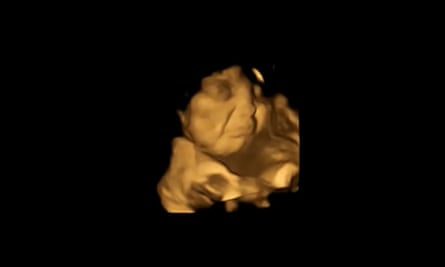If the taste of kale makes you screw up your face, you are not alone: researchers have observed foetuses pull a crying expression when exposed to the greens in the womb.
While previous studies have suggested our food preferences may begin before birth and can be influenced by the mother’s diet, the team says the new research is the first to look directly at the response of unborn babies to different flavours.
“[Previously researchers] just looked at what happens after birth in terms of what do [offspring] prefer, but actually seeing facial expressions of the foetus when they are getting hit by the bitter or by the non-bitter taste, that is something which is completely new,” said Prof Nadja Reissland, from Durham University, co-author of the research.

Writing in the journal Psychological Science, the team noted that aromas from the mother’s diet were present in the amniotic fluid. Taste buds can detect taste-related chemicals from 14 weeks’ gestation, and odour molecules can be sensed from 24 weeks’ gestation.
To delve into whether foetuses differentiate specific flavours, the team looked at ultrasound scans from almost 70 pregnant women, aged 18 to 40 from the north-east of England, who were split into two groups. One group was asked to take a capsule of powdered kale 20 minutes before an ultrasound scan, and the other was asked to take a capsule of powdered carrot. Vegetable consumption by the mothers did not differ between the kale and carrot group.
The team also examined scans from 30 women, taken from an archive, who were not given any capsules.
All the women were asked to refrain from eating anything else in the hour before their scans.
The team then carried out a frame-by-frame analysis of the frequency of a host of different facial movements of the foetuses, including combinations that resembled laughing or crying.
Overall, the researchers examined 180 scans from 99 foetuses, scanned at either 32 weeks, 36 weeks, or at both time points.
Among the results, the team found foetuses showed a crying expression about twice as often when the mother consumed a kale capsule compared with a carrot capsule or no capsule. When the mother consumed a carrot capsule however, the foetuses adopted a laughter-like expression about twice as often as they did when either a kale capsule or no capsule was swallowed by the mother.
Dr Benoist Schaal, an author of the work, from the Centre for Taste and Feeding Behaviour at the University of Burgundy, told the Guardian the clarity of the results was surprising.
“[They mean] the mother has not yet finished her meal [when] the foetus is already aware, or capable of sensing, what the mother has eaten,” he said.
Beyza Ustun, first author of the research, said the team was now looking to explore the reaction of babies after birth to the different flavours. “Hopefully we will see less negative reactions, if they were exposed to kale prenatally,” she said.
Reissland added the study could also offer a useful way to talk to pregnant women about what they eat. “What [we] know from other research is actually that if the mother has a varied diet, like vegetables and fruits etc, babies are much less fussy eaters,” she said.
Dr Julie Mennella, an expert in the field from the Monell Chemical Senses Center in the US, who was not involved in the study, noted the research supported previous work showing offspring begin to learn about the mother’s diet through food flavours present in amniotic fluid.
But she cautioned the pregnant women were not randomised to experimental or control groups, and that prior exposure of the foetuses in the control group to different vegetables – including carrots and kale – was not known.
Prof Catherine Forestell, of the College of William & Mary, said the work provided a window into the chemosensory world of the human foetus.
“Future work that highlights individual differences in foetal responses to flavours and how they relate to mothers’ dietary habits and infants’ responses to foods after birth will be of great interest,” Forestell added.
